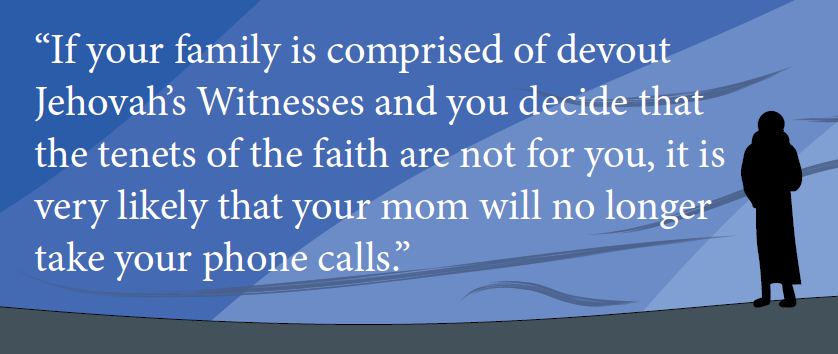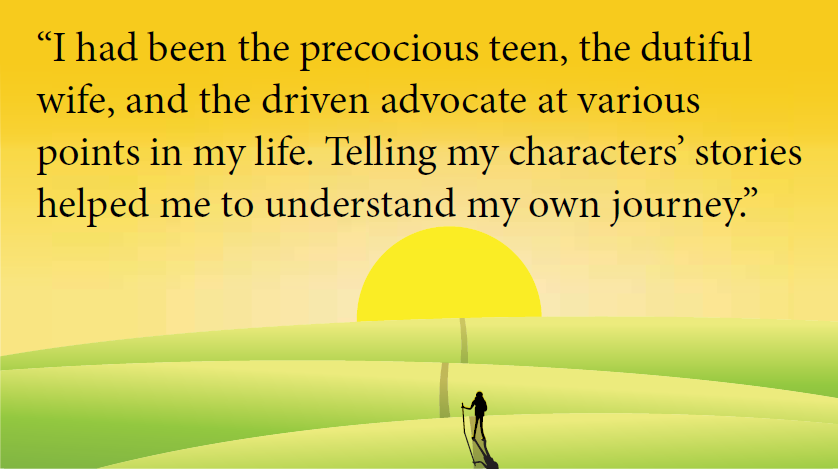FIRST PERSON | Lemons or Lemonade – Reclaiming My Story
 Photo by Yannick Pulver on Unsplash
Photo by Yannick Pulver on Unsplash In her classic novel, Song of Solomon, Toni Morrison exhorts, “Stop sniveling. Stop picking around the edges of the world. Take advantage, and if you can’t take advantage, take disadvantage.” Before I could take advantage of my disadvantage, I had to first reclaim my own story of faith deconstruction.
I was born into a Jehovah’s Witness family in a small town in Georgia. My family was devout and the restrictive tenets of the faith fit me—an outspoken, nerdy Black girl—as uncomfortably as a turtleneck two sizes too small. There were So. Many. Rules. No birthday parties. No holidays (Halloween, Thanksgiving, Christmas, Easter, Independence Day…). Jehovah’s Witnesses’ children are strongly discouraged from playing sports, socializing with non-Witnesses, or attending college. In fact, the only thing that Witness youths are constantly directed to do is to proselytize.
That is why if you lived in western Georgia or eastern Alabama during the 1980s and 90s, chances are that I appeared unsolicited on your front porch on a random Saturday morning, smiling brightly and asking canned queries designed to pique your interest before you decided to slam your door shut:
- “Have you ever wondered why God allows evil and suffering?”
- “Since God is almighty, do you think that he should be held responsible for all the bad things that happen in the world?”
Regardless of a householder’s response, I was there to share scripture and religious literature. And unless you threatened to prosecute for trespassing, we Witnesses were taught to note your name and address to make an uninvited return visit. My duty was clear: I was supposed to convert you before God’s impending destruction at Armageddon because the only survivors would be other Jehovah’s Witnesses.
 Our directives came from a Governing Body of eight men and, for more than 100 years, all white men. The Governing Body utters edicts that impact every aspect of the personal lives of Jehovah’s Witnesses: the music that they can listen to; the movies that are permissible to watch; the type of medical treatment that members can accept; the people with whom they can be intimate and the types of intimacy that is permissible. Ask any Witness how these men are selected and what the qualifications are and you will receive a vague reply about the divine appointment by Holy Spirit because we didn’t have a clue. The choosing of the white men who direct members’ actions from the cradle to the grace was and is shrouded in secrecy.
Our directives came from a Governing Body of eight men and, for more than 100 years, all white men. The Governing Body utters edicts that impact every aspect of the personal lives of Jehovah’s Witnesses: the music that they can listen to; the movies that are permissible to watch; the type of medical treatment that members can accept; the people with whom they can be intimate and the types of intimacy that is permissible. Ask any Witness how these men are selected and what the qualifications are and you will receive a vague reply about the divine appointment by Holy Spirit because we didn’t have a clue. The choosing of the white men who direct members’ actions from the cradle to the grace was and is shrouded in secrecy.
For me, trying to navigate my Black identity formation in a deeply segregated small town was already difficult. LaGrange, Georgia had whites-only libraries, swimming pools, tennis courts, etc. until the 1996 Olympics in Atlanta. Having to explain my family’s unconventional religious beliefs simply added another layer of difficulty.
If it sounds as if being reared as a Jehovah’s Witness was difficult, leaving the Witness religion is even harder. There are dozens of well-documented experiences of former Witnesses and the price that they paid for leaving. Jehovah’s Witnesses are directed to shun friends and even relatives who leave the faith or those who break the religion’s rules and are excommunicated or disfellowshipped. This isn’t the same type of cajoling to attend church on Sunday that a church-going Methodist mom gives her lapsed Methodist child. If your family is comprised of devout Jehovah’s Witnesses and you decide that the tenets of the faith are not for you, it is very likely that your mom will no longer take your phone calls. Your adult children will reject you and you will probably not be allowed to meet your grandchildren. Your sister will not invite you to her wedding. And the only friends that you have been allowed to cultivate since childhood will not even make eye contact with you in a Starbucks.
To hear about these experiences from people who have lived them, see Leah Remini’s third season of her A&E show, Aftermath, or read Crisis of Conscience by Raymond Franz, Leaving The Witness: Exiting A Religion and Finding a Life by Amber Scorah, Eyewitness to Deceit by Barbara Anderson, or Shunned by Linda A. Curtis.
My break from the religion was gradual. After tiring of low-paying jobs, I rebelled against Jehovah’s Witness restrictions and decided to attend college when I was in my thirties. My experience was akin to Tara Westover’s transformative experience in her memoir, Educated. At Salem College—a woman’s college in Winston-Salem, North Carolina—smart, outspoken women taught me to analyze my belief system critically, to challenge my understanding of gender roles, and to re-imagine the possibilities for my future. After I graduated with a degree in English literature and creative writing, I attended law school. For the last twelve years, I have worked for nonprofit law firms. As an attorney, I have represented hundreds of clients who live below federal poverty limits, helping them to gain access to disability benefits, special education supports and services, and adequate health care.
Still, my faith deconstruction journey had not come full circle. In Exiting the JW Cult, A Healing Handbook, psychotherapist Bonnie Zieman posits that writing about your specific fundamentalist experiences can be a helpful form of psychological debriefing. Chronicling my losses and describing my newfound freedom was part and parcel of documenting my personal narrative.
I learned to blog about my faith deconstruction in a personal blog, callmevashti.com.
As an avid reader and a writer, fiction has always been both my escape and the medium that helps me to make sense of the world. Subsequently, during the 2020 pandemic timeout, I developed a story about a fundamentalist sect, True Antioch Believers, who live in a rural North Carolina hamlet. True Antioch Believers reject all “portals to the Devil”: stylish clothing, social media, secular music, and college education. And they take 1 Corinthians 14:33-35 very, very seriously.
“Let your women keep silence in the churches: for it is not permitted unto them to speak; but they are commanded to be under obedience, as also saith the law. And if they will learn anything, let them ask their husbands at home: for it is a shame for women to speak in the church.”
 To adhere to this edict, Antioch women take a vow of silence when they marry. From that point on, only their husbands and children will ever hear their voices.
To adhere to this edict, Antioch women take a vow of silence when they marry. From that point on, only their husbands and children will ever hear their voices.
I spent the greater part of 2020 creating my very own religious cult for the novel: an insular, high-control religion with customs and doctrines that fell somewhere on a spectrum between the Quiverfull/Duggar family worldview and Margaret Atwood’s Gilead dystopia. I created my religion’s origin story, its leaders’ back stories, and its unique misogynistic doctrines. My writing project was oddly empowering. Developing characters was extraordinarily cathartic as I centered the perspectives of intriguing women:
- Ellen, a single teen mom of a biracial infant, Cara Grace. Ellen converts to the Antioch faith and marries a prominent Elder, Joseph Dupree.
- Cara Grace, now a precocious teen who would rather leave Antioch and attend college than marry and become an obedient and silent wife.
- Juanita Boston, a Black social worker who bonds with Cara Grace and who crosses boundaries to introduce the young woman to life beyond the rigid confines in Antioch.
I had been the precocious teen, the dutiful wife, and the driven advocate at various points in my life. Telling my characters’ stories helped me to understand my own journey.
My pandemic project became a manuscript and now my manuscript has become a novel, Sunless and Silent and Deep, published by Moonshine Cove Publishing in October 2022.
As a single mom still paying off student loans, I realize that my story is one of the few things that I own outright. My regrets and successes, my missteps and corrections are uniquely mine. Telling my story in my own way is empowering. I hope it resonates with others who have had to leave a way of life to find themselves.
